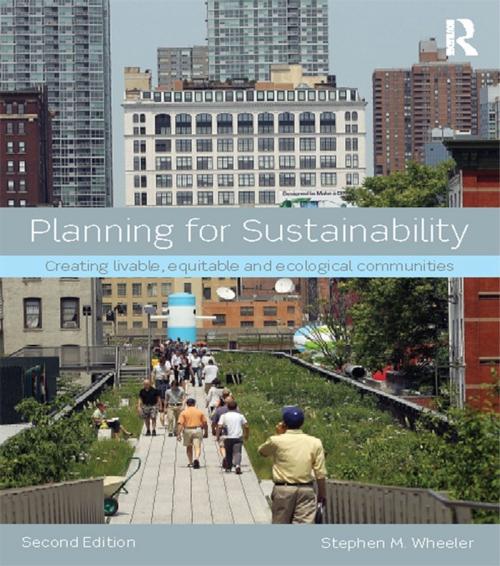Planning for Sustainability
Creating Livable, Equitable and Ecological Communities
Nonfiction, Art & Architecture, Architecture, Planning, Science & Nature, Science, Earth Sciences, Geography| Author: | Stephen M. Wheeler | ISBN: | 9781136482007 |
| Publisher: | Taylor and Francis | Publication: | July 18, 2013 |
| Imprint: | Routledge | Language: | English |
| Author: | Stephen M. Wheeler |
| ISBN: | 9781136482007 |
| Publisher: | Taylor and Francis |
| Publication: | July 18, 2013 |
| Imprint: | Routledge |
| Language: | English |
How can human communities sustain a long-term existence on a small planet? This challenge grows ever more urgent as the threat of global warming increases.
Planning for Sustainability presents a wide-ranging, intellectually well-grounded and accessible introduction to the concept of planning for more sustainable and livable communities. The text explores topics such as how more compact and walkable cities and towns might be created, how local ecosystems can be restored, how social inequalities might be reduced, how greenhouse gas emissions might be lowered, and how more sustainable forms of economic development can be brought about.
The second edition has been extensively revised and updated throughout, including an improved structure with chapters now organized under three sections: the nature of sustainable planning, issues central to sustainable planning, and scales of sustainable planning. New material includes greater discussion of climate change, urban food systems, the relationships between public health and the urban environment, and international development.
Building on past schools of planning theory, Planning for Sustainability lays out a sustainability planning framework that pays special attention to the rapidly evolving institutions and power structures of a globalizing world. By considering in turn each scale of planning—international, national, regional, municipal, neighborhood, and site and building—the book illustrates how sustainability initiatives at different levels can interrelate. Only by weaving together planning initiatives and institutions at different scales, and by integrating efforts across disciplines, can we move towards long-term human and ecological well-being.
How can human communities sustain a long-term existence on a small planet? This challenge grows ever more urgent as the threat of global warming increases.
Planning for Sustainability presents a wide-ranging, intellectually well-grounded and accessible introduction to the concept of planning for more sustainable and livable communities. The text explores topics such as how more compact and walkable cities and towns might be created, how local ecosystems can be restored, how social inequalities might be reduced, how greenhouse gas emissions might be lowered, and how more sustainable forms of economic development can be brought about.
The second edition has been extensively revised and updated throughout, including an improved structure with chapters now organized under three sections: the nature of sustainable planning, issues central to sustainable planning, and scales of sustainable planning. New material includes greater discussion of climate change, urban food systems, the relationships between public health and the urban environment, and international development.
Building on past schools of planning theory, Planning for Sustainability lays out a sustainability planning framework that pays special attention to the rapidly evolving institutions and power structures of a globalizing world. By considering in turn each scale of planning—international, national, regional, municipal, neighborhood, and site and building—the book illustrates how sustainability initiatives at different levels can interrelate. Only by weaving together planning initiatives and institutions at different scales, and by integrating efforts across disciplines, can we move towards long-term human and ecological well-being.















